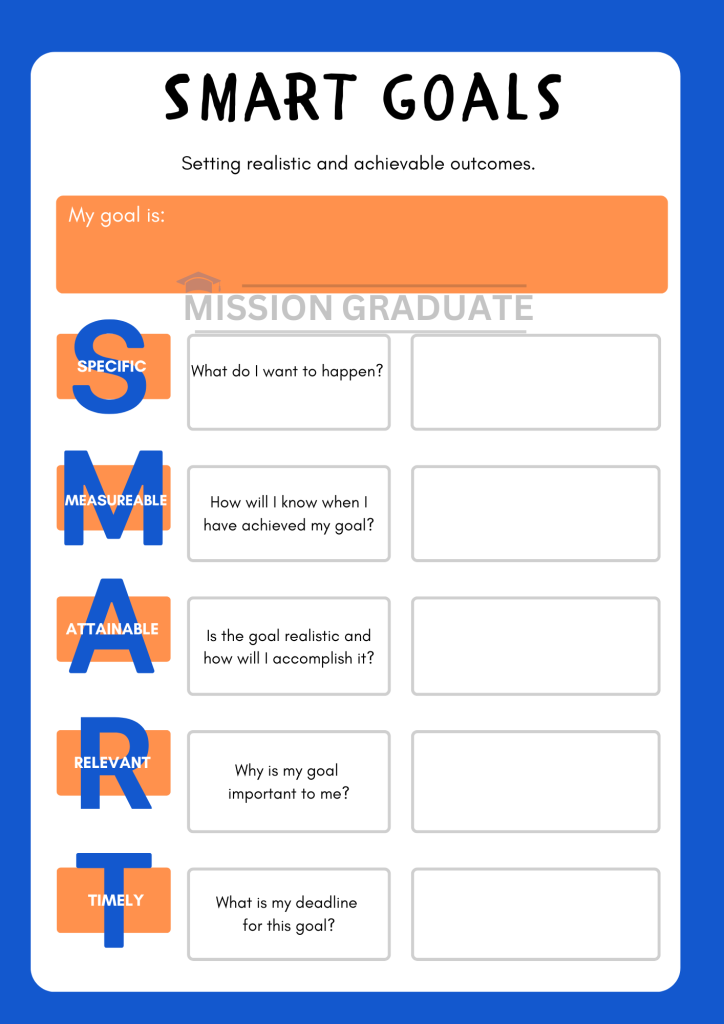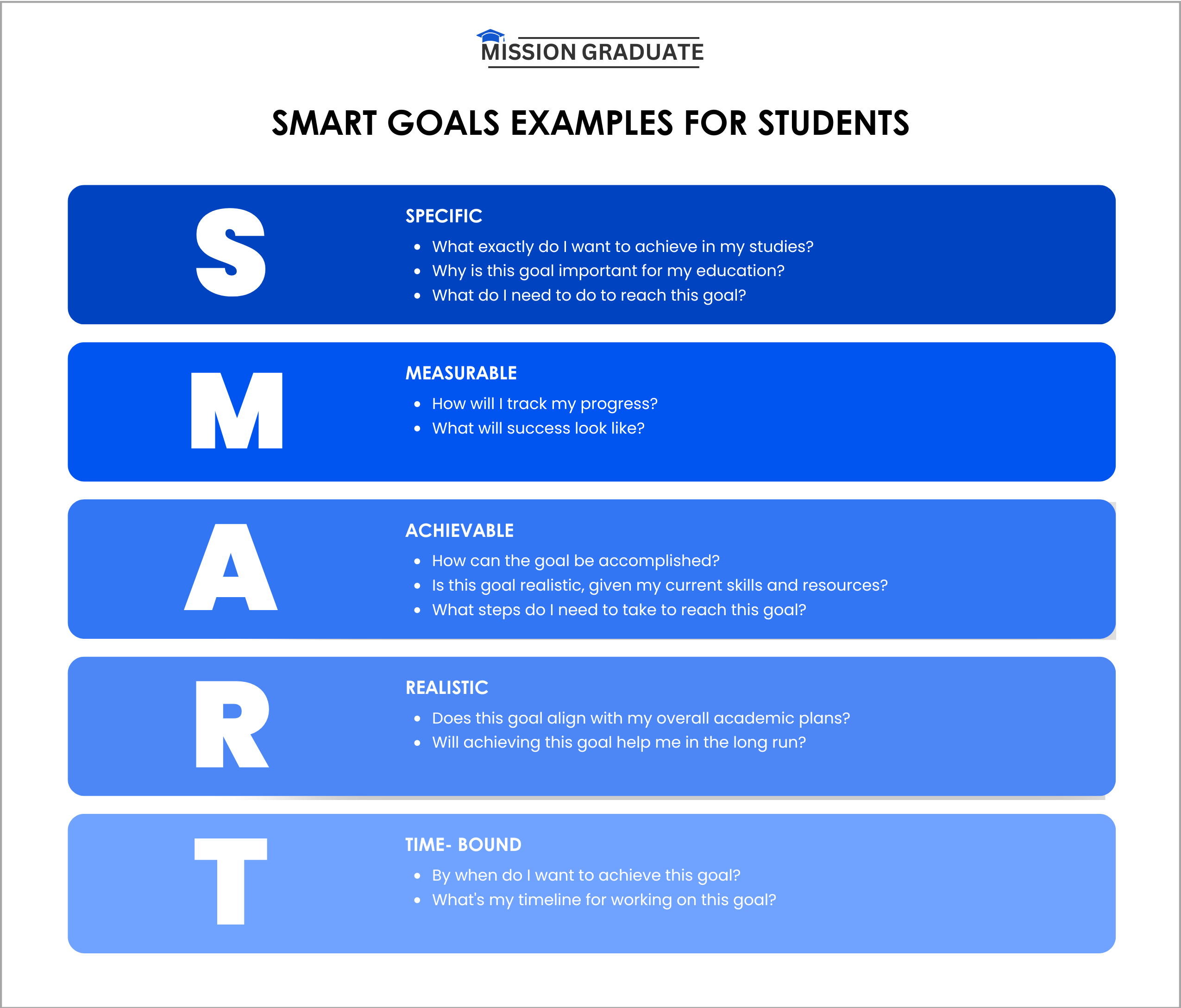In this guide, I will share my template for creating your own SMART goals for students, followed by 22 real-world examples covering everything from boosting your GPA to mastering a new language.
Whether high school or college, these SMART Goals examples and templates will help you study better.
Use these examples as inspiration to set goals using the template because the best goals are tailored to your unique situation.
Smart Goals Examples For Students Template
Here is a template you can download and print it. Have a look at this template and find how to use this template and other explanations under it:

To use this template, start with your general goal. Go through each template section, answering the questions as thoroughly as possible.
- For “Specific,” clearly define what you want to achieve academically and why it’s important. This helps focus your efforts.
- Under “Measurable,” determine how you’ll track your progress. This could be graded, completed assignments, or hours studied.
- For “Achievable,” break down your goal into manageable steps. Given your current situation, make sure it’s challenging but not impossible.
- In the “Relevant” section, ensure your goal aligns with your broader educational objectives. This keeps you motivated.
- Finally, for “Time-Bound,” set a clear deadline. This creates urgency and helps with planning.
How To Write A Smart Goal For Education?
Follow these steps to create a practical SMART goal using the Free SMART goals template:
- Start with a fundamental goal idea.
- Make it specific by answering who, what, where, when, and why.
- Add measurable criteria
- Ensure it’s achievable, given your current resources and abilities.
- Check its relevance to your overall objectives.
- Set a deadline.
After completing the template, use your answers to formulate a comprehensive SMART goal statement. For example –
A student might start with, “I want to improve my math grade.” After going through the template, they might end up with:
“I will raise my math grade from a C to a B by the end of this semester by studying for 1 hour each day, completing all homework assignments, and attending weekly tutoring sessions. This will help improve my GPA and prepare me for advanced math courses next year.”
Using this template, you can transform vague goals into clear, actionable plans that increase students’ chances of academic success.
22 SMART Goals Examples for Students

In these 22 Smart Goals Examples for Students, you will find examples for the respective categories between the numerical given below:
- SMART Goals Examples for Students in School (1-5)
- Academic SMART Goals Examples for Students (6-10)
- SMART Goals Examples for College Students (11-15)
- Short-Term SMART Goals Examples for Students (16-20)
- SMART Goals Examples for Work and Career (21-22)
I will now be giving SMART Goal examples from a student’s perspective. Since these are just examples you can change a few words and your targets as you like. Just remember to set realistic challenges.
1. Improve GPA
“I will increase my overall GPA from 3.2 to 3.5 by the end of this semester by dedicating an extra hour of study time each day, seeking help from professors during office hours, and forming a study group for my most challenging classes.”
Specific: The goal clearly defines increasing GPA from 3.2 to 3.5.
Measurable: GPA is a quantifiable metric that can be tracked throughout the semester.
Achievable: A 0.3 GPA increase in one semester is realistic with the outlined action plan.
Relevant: The goal directly relates to academic success.
Time-bound: The deadline is set for the end of the semester.
2. Read More Books
“I will read one non-fiction book related to my major each month for the next six months, spending 30 minutes reading before bed each night to broaden my knowledge and improve my critical thinking skills.”
Specific: The goal is to read one non-fiction book per month related to the student’s major.
Measurable: Progress can be tracked by the number of books read and the time spent reading daily.
Achievable: Reading one book per month with 30 minutes of daily reading is realistic.
Relevant: The goal aims to broaden knowledge and improve critical thinking skills.
Time-bound: The goal is set for the next six months.
3. Enhance Time Management Skills
“I will reduce my procrastination and improve my time management by using a digital planner to schedule all my tasks and assignments, allocating specific time blocks for studying, and reducing social media use to 30 minutes daily, all within the next two weeks.”
Specific: The goal outlines specific actions to improve time management.
Measurable: Progress can be tracked using a digital planner and reduced social media time.
Achievable: The actions outlined are realistic and can be implemented within two weeks.
Relevant: Improved time management directly relates to academic success.
Time-bound: The goal has a two-week timeframe.
4. Increase Class Participation
“I will contribute to class discussions at least three times per week in each course by preparing questions before class, actively listening to lectures, and overcoming my fear of public speaking through practice, starting next week and continuing throughout the semester.”
Specific: The goal is to contribute three times per week in each course.
Measurable: Contributions can be counted and tracked weekly.
Achievable: The goal provides specific actions to make participation more achievable.
Relevant: Increased participation can improve understanding and engagement in courses.
Time-bound: The goal starts next week and continues throughout the semester.
In a world increasingly shaped by AI and automation, creativity stands out as a timeless and invaluable human skill. Whether it’s music, film, writing, or digital content creation, industries fueled by originality and emotion are still booming. Explore SimpleBeen’s Entertainment Hub — it’s a space where culture, creativity, and community collide to inspire the next generation of creators. Platforms like this emphasize how important it is for students to nurture creative goals alongside academic ones.
5. Develop Better Study Habits
“I will improve my study habits by creating and sticking to a study schedule, using active recall techniques, and taking comprehensive notes for all my classes, improving my test scores by at least 10% within the next two months.”
Specific: The goal outlines specific actions to improve study habits.
Measurable: Progress can be measured by adherence to the schedule and improvement in test scores.
Achievable: A 10% improvement in test scores over two months is realistic with improved study habits.
Relevant: Better study habits directly relate to academic performance.
Time-bound: The goal has a two-month timeframe.
6. Improve Physical Fitness
“I will improve my cardiovascular endurance by running for 30 minutes three times a week, gradually increasing my distance by 10% each week, to prepare for the school’s 5K run in two months.”
Specific: The goal clearly defines running for 30 minutes three times a week, with a 10% weekly distance increase.
Measurable: Progress can be tracked by running frequency, duration, and distance increase.
Achievable: Gradual increase in distance makes the goal realistic.
Relevant: Improving cardiovascular endurance is directly related to preparing for the 5K run.
Time-bound: The goal has a two-month deadline aligned with the school’s 5K run.
7. Learn A New Language
“I will achieve conversational proficiency in French by studying for 1 hour daily using a language learning app, attending weekly language exchange meetups, and completing one French novel by the end of the semester.”
Specific: The goal outlines daily study, weekly meetups, and writing a French novel.
Measurable: Progress can be tracked by daily study time, meetup attendance, and novel completion.
Achievable: The actions are realistic and spread over a semester.
Relevant: Achieving conversational proficiency is a precise language learning objective.
Time-bound: The goal is set for the end of the semester.
8. Enhance Research Skills
“I will improve my research skills by completing the university library’s online research methods course, applying these techniques to my next three assignments, and increasing my use of peer-reviewed sources by 50% within the next two months.”
Specific: The goal includes completing a course, applying techniques, and increasing the use of peer-reviewed sources.
Measurable: Progress can be tracked by course completion, technique application, and source usage increase.
Achievable: The 50% increase in peer-reviewed sources is challenging but realistic in two months.
Relevant: Improving research skills is crucial for academic success.
Time-bound: The goal has a two-month timeframe.
9. Improve Public Speaking Abilities
“I will enhance my public speaking skills by joining the campus Toastmasters club, delivering one prepared speech and one impromptu speech per month, to reduce my speech anxiety by 50% before the end of the academic year.”
Specific: The goal outlines joining Toastmasters and delivering monthly speeches.
Measurable: Progress can be tracked by club attendance, speeches delivered, and anxiety reduction.
Achievable: Monthly speeches provide regular practice for improvement.
Relevant: Enhancing public speaking skills is valuable for academic and professional development.
Time-bound: The goal is set for the end of the academic year.
10. Secure An Internship
“I will secure a summer internship in my field by updating my resume, applying to 15 positions, and practicing interview skills with a career counselor to gain practical experience by May 1st.”
Specific: The goal includes updating your resume, applying to positions, and practicing interview skills.
Measurable: Progress can be tracked by resume completion, number of applications, and interview practice sessions.
Achievable: Applying to 15 positions is challenging but realistic.
Relevant: Securing an internship provides practical experience in the student’s field.
Time-bound: The goal has a clear deadline of May 1st.
11. Reduce Procrastination
“I will reduce my procrastination by using the Pomodoro Technique for studying, completing assignments at least two days before deadlines, and limiting social media use to 30 minutes per day, all within the next month.”
Specific: The goal outlines using the Pomodoro Technique, completing assignments early, and limiting social media use.
Measurable: Progress can be tracked by adherence to the Pomodoro Technique, assignment completion dates, and social media usage time.
Achievable: The actions are realistic and can be implemented within a month.
Relevant: Reducing procrastination directly impacts academic performance.
Time-bound: The goal has a one-month timeframe.
12. Improve Writing Skills
“I will enhance my writing skills by writing in a journal for 15 minutes daily, attending two writing workshops this semester, and submitting one article to the school newspaper by the end of the term.”
Specific: The goal includes daily journaling, attending workshops, and submitting an article.
Measurable: Progress can be tracked by daily journal entries, workshop attendance, and article submission.
Achievable: The actions are realistic and spread over a semester.
Relevant: Improving writing skills is valuable for academic and professional development.
Time-bound: The goal is set for the end of the term.
13. Build A Professional Network
“I will expand my professional network by attending three industry networking events, connecting with 20 professionals on LinkedIn, and scheduling informational interviews with two alumni in my field within the next three months.”
Specific: The goal outlines attending events, connecting on LinkedIn, and scheduling interviews.
Measurable: Progress can be tracked by the number of events attended, connections made, and interviews scheduled.
Achievable: The targets are realistic within three months.
Relevant: Building a professional network is crucial for career development.
Time-bound: The goal has a three-month timeframe.
14. Enhance Digital Literacy
“I will improve my digital literacy by completing one online course in data analysis, creating a personal website, and learning basic coding skills through a coding bootcamp, all within the next semester.”
Specific: The goal includes completing a course, creating a website, and learning coding skills.
Measurable: Progress can be tracked by course completion, website creation, and coding skill acquisition.
Achievable: The actions are realistic and can be completed within a semester.
Relevant: Digital literacy is increasingly important in many fields.
Time-bound: The goal is set for the next semester.
15. Improve Mental Health And Well-being
“I will prioritize my mental health by practicing meditation for 10 minutes daily, attending bi-weekly counseling sessions, and engaging in one stress-relieving activity each week for the next three months.”
Specific: The goal includes daily meditation, bi-weekly counseling, and weekly stress-relief activities.
Measurable: Progress can be tracked by meditation practice, counseling attendance, and stress-relief activities.
Achievable: The actions are realistic and can be incorporated into a daily/weekly routine.
Relevant: Mental health is crucial for overall well-being and academic success.
Time-bound: The goal has a three-month timeframe.
16. Start Planning Career Goals
“I will research three potential career paths by interviewing one professional in each field and completing a career aptitude test to help choose my college major by the end of this semester.”
Specific: The goal clearly defines researching three career paths and completing a career aptitude test.
Measurable: Progress can be tracked by the number of interviews and test completion.
Achievable: Interviewing three professionals and taking a test is realistic within a semester.
Relevant: This goal directly relates to choosing a college primary and future career path.
Time-bound: The goal is set to be completed by the end of the semester.
17. Apply To Five Colleges
“I will apply to five colleges that offer my desired major by completing one application per week, starting next Monday, to ensure I meet all deadlines by December 1st.”
Specific: The goal outlines applying to five colleges offering the desired major.
Measurable: Progress can be tracked by the number of weekly applications completed.
Achievable: Completing one application per week is a realistic pace.
Relevant: This goal is crucial for pursuing higher education in the desired field.
Time-bound: The goal has a clear deadline of December 1st.
18. Improve GPA
“I will increase my GPA from 3.0 to 3.5 by dedicating 2 hours of focused study time each day and seeking help from teachers when needed to qualify for more scholarships by the end of this school year.”
Specific: The goal defines increasing GPA from 3.0 to 3.5 through focused study and seeking help.
Measurable: GPA improvement can be tracked throughout the school year.
Achievable: A 0.5 GPA increase is challenging but attainable with consistent effort.
Relevant: Improving GPA is directly related to qualifying for more scholarships.
Time-bound: The goal is set for the end of the school year.
19. Get Better Grades
“I will improve my grade in Biology from a C to a B by attending all lectures, participating in study groups twice a week, and completing practice quizzes to better understand the material by the end of this semester.”
Specific: The goal outlines improving Biology grade from C to B through specific actions.
Measurable: Grade improvement can be tracked throughout the semester.
Achievable: The actions listed (attending lectures, study groups, practice quizzes) make the goal realistic.
Relevant: Improving grades directly relates to a better understanding of the material.
Time-bound: The goal is set for the end of the semester.
20. Improve Organization
“I will improve my organization by using a digital planner to track all assignments and deadlines, reviewing it daily, and color-coding tasks by priority to reduce stress and improve time management within the next month.”
Specific: The goal define using a digital planner, daily reviews, and color-coding tasks.
Measurable: Progress can be tracked by consistent use of the planner and task completion.
Achievable: The actions are realistic and can be implemented within a month.
Relevant: Improving the organization directly impacts stress reduction and time management.
Time-bound: The goal has a one-month timeframe.
21. Secure Internships
“I will secure a summer internship in my field by applying to at least 10 positions, tailoring my resume for each, and practicing interview skills with the career center to gain practical experience by May 1st.”
Specific: The goal is to apply to 10 positions, tailoring resumes, and practicing interview skills.
Measurable: Progress can be tracked by the number of applications submitted and interview practice sessions.
Achievable: Applying to 10 positions is challenging but realistic.
Relevant: Securing an internship provides practical experience in the student’s field.
Time-bound: The goal has a clear deadline of May 1st.
22. Memorize 100 Flashcards
“I will memorize 100 Spanish vocabulary flashcards by studying 20 words per day for 30 minutes, using spaced repetition techniques, to prepare for my upcoming Spanish test in 3 weeks.”
Specific: The goal is to memorize 100 Spanish vocabulary flashcards using specific techniques.
Measurable: Progress can be tracked by the number of words memorized daily.
Achievable: Studying 20 words per day for 30 minutes is a realistic goal.
Relevant: This directly prepares the student for the upcoming Spanish test.
Time-bound: The goal has a clear three-week timeframe.
How To Get Success With Smart Goals?
In their research paper, Poe et al. (2021) found that students who engaged in reflection and planning activities with a growth mindset focused on positive outcomes in their learning.
Since I read this study, I have done a few additional things that require minimal effort but help me build a growth mindset focused on positive outcomes. To follow your SMART goals and achieve them, you also do these things:
- Write your goals down and keep them visible.
- Review and adjust your progress regularly.
- Celebrate small achievements.
- Seek help when needed.
Related Reads:
Conclusion: SMART Goals Examples For Students Can Improve Academic Performance!
Woods (2019) notes in his study on SMART Goals Examples For Students that it can promote a growth mindset in students, leading to improved academic performance.
SMART goals provide a structured approach for students to set and achieve their academic and personal objectives.
Using the provided template and examples, you can create specific, measurable, achievable, relevant, and time-bound goals tailored to your needs.
Remember, consistent review and adjustment are the keys to success with SMART goals. Start by selecting one area to improve, create your SMART goal using the provided template, and take action today.
Your future academic and professional success begins with setting the right goals now.

